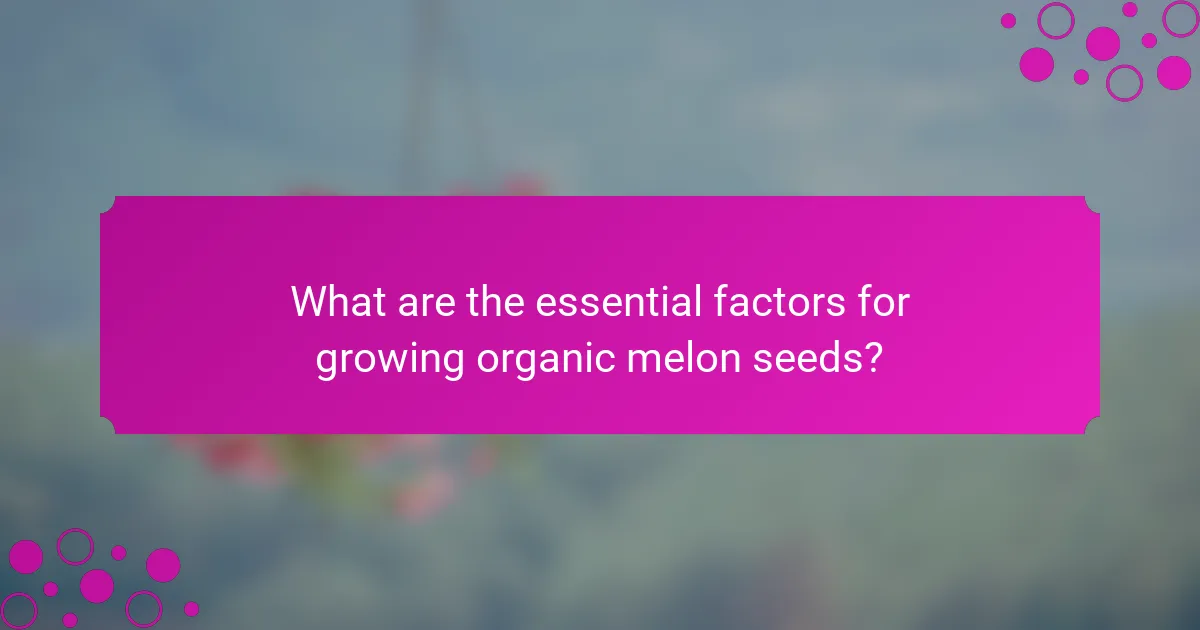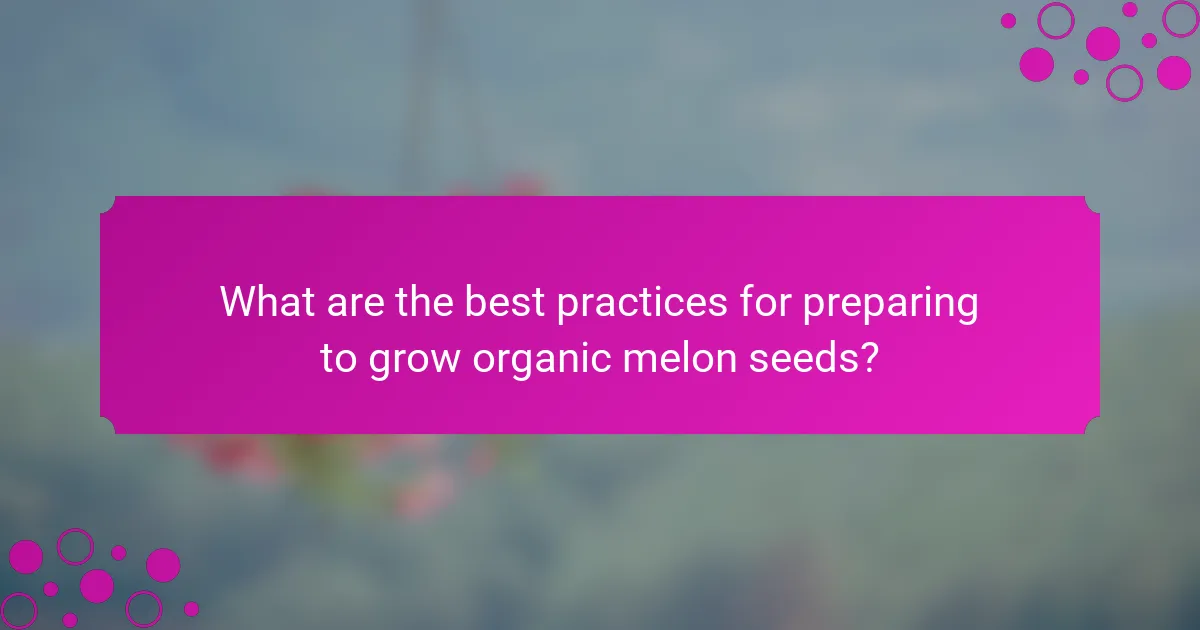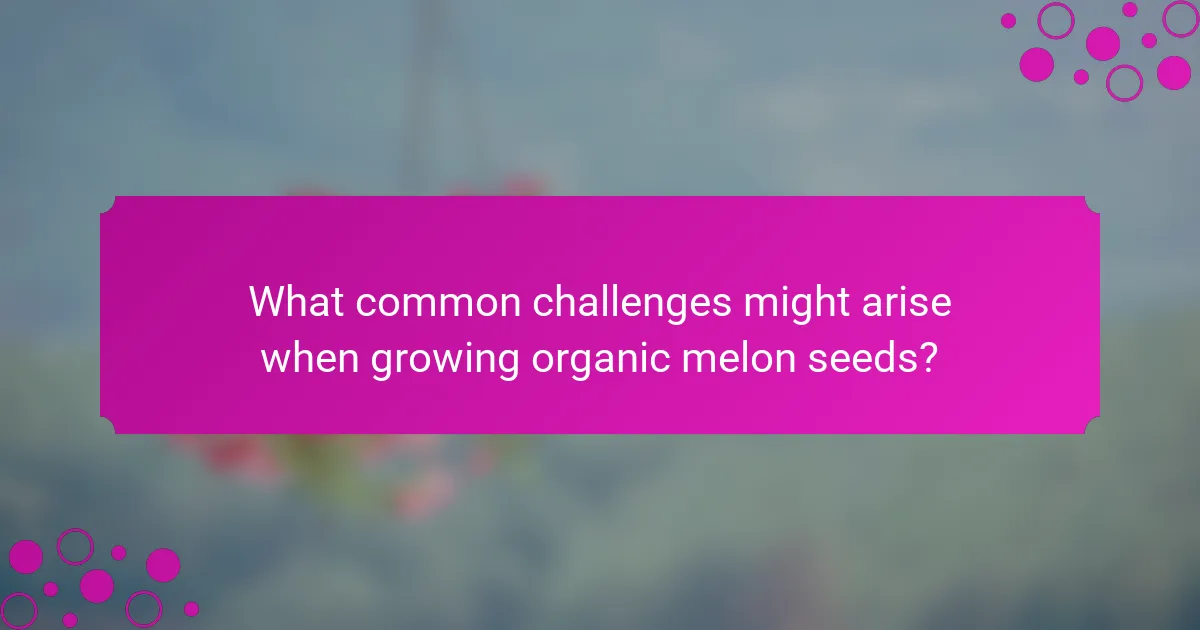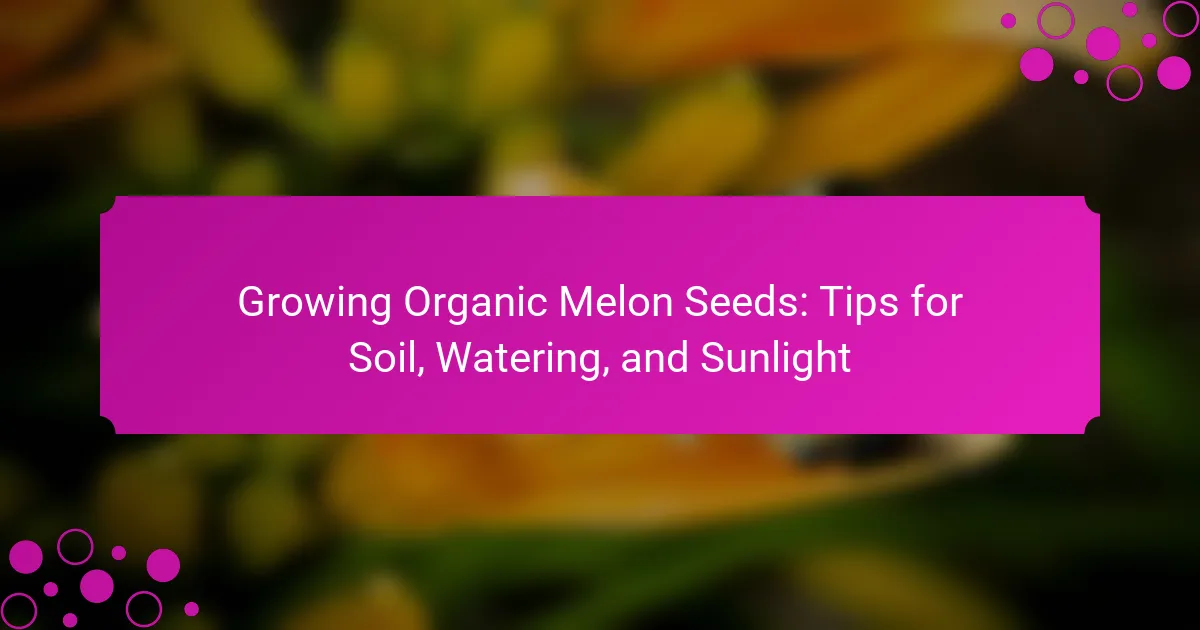Growing organic melon seeds requires attention to essential factors such as soil quality, watering practices, and sunlight exposure. Optimal soil for melons should be rich in organic matter, well-drained, and have a pH between 6.0 and 6.8. Consistent moisture is crucial throughout the germination and fruit development stages, with drip irrigation recommended to avoid waterlogging. Melons thrive in full sun, requiring 6 to 8 hours of direct sunlight daily. The article also addresses best practices for seed selection, soil preparation, and common challenges like pests, diseases, and nutrient deficiencies, providing strategies for successful organic melon cultivation.

What are the essential factors for growing organic melon seeds?
The essential factors for growing organic melon seeds include soil quality, watering practices, and sunlight exposure. Healthy soil should be rich in organic matter and well-drained. It is important to test the soil pH, aiming for a range of 6.0 to 6.8. Adequate watering is crucial; melons require consistent moisture, especially during germination and fruit development. Drip irrigation is often recommended to prevent waterlogging. Sunlight is also vital; melons need full sun, ideally 6 to 8 hours of direct sunlight daily. These conditions support optimal growth and fruit yield.
How does soil quality impact the growth of organic melon seeds?
Soil quality significantly affects the growth of organic melon seeds. Healthy soil provides essential nutrients, water retention, and proper pH levels. Nutrient-rich soil promotes robust seedling development and enhances fruit yield. Soil texture influences drainage and aeration, which are crucial for root health. A balanced pH level, ideally between 6.0 and 6.8, supports nutrient availability for melons. Poor soil quality can lead to stunted growth and low fruit production. Research indicates that organic amendments improve soil structure and fertility, benefiting melon crops. Thus, high-quality soil is vital for successful organic melon cultivation.
What are the ideal soil types for planting organic melon seeds?
The ideal soil types for planting organic melon seeds are sandy loam and well-draining soils. Sandy loam provides good drainage while retaining moisture. This balance is crucial for melon growth. The soil pH should be between 6.0 and 6.8. This range promotes nutrient availability for melons. Organic matter, such as compost, enhances soil fertility. Rich, nutrient-dense soil supports healthy plant development. Additionally, avoid heavy clay soils that retain too much water. Proper soil conditions lead to better yields and fruit quality.
How can soil pH affect the health of organic melons?
Soil pH significantly affects the health of organic melons. It influences nutrient availability in the soil. Melons thrive in slightly acidic to neutral pH levels, ideally between 6.0 and 7.0. When soil pH is too low or too high, nutrient deficiencies can occur. For instance, low pH can lead to aluminum toxicity, affecting root growth. High pH can limit the availability of essential nutrients like iron and manganese. Research shows that optimal pH levels promote better root development and fruit quality. Healthy melons typically have higher sugar content and better flavor when grown in suitable pH conditions.
What role does watering play in the cultivation of organic melon seeds?
Watering is essential for the successful cultivation of organic melon seeds. It ensures adequate moisture for seed germination and plant growth. Consistent watering helps maintain soil structure and nutrient availability. Melons require about 1 to 2 inches of water per week during the growing season. Insufficient watering can lead to poor seedling development and reduced fruit yield. Overwatering can cause root rot and other diseases. Therefore, balanced watering practices are crucial for optimal melon growth. Proper watering techniques enhance overall crop health and productivity.
How often should organic melon seeds be watered for optimal growth?
Organic melon seeds should be watered consistently every 2 to 3 days for optimal growth. This frequency ensures that the soil remains moist but not waterlogged. Melon seeds thrive in well-drained soil that retains some moisture. Overwatering can lead to root rot, while underwatering can hinder germination. Soil should be checked regularly to determine moisture levels. A good rule of thumb is to water when the top inch of soil feels dry. Consistent watering promotes healthy root development and overall plant vigor.
What are the signs of overwatering or underwatering organic melons?
Signs of overwatering organic melons include yellowing leaves, wilting despite wet soil, and root rot. These symptoms indicate that the roots are saturated and unable to access oxygen. Overwatered melons may also develop a mushy texture and exhibit stunted growth.
On the other hand, signs of underwatering include wilting leaves, dry soil, and slow growth. The leaves may curl or become crispy at the edges. Underwatered melons typically show signs of stress, such as smaller fruit size and poor development.
Both conditions can severely impact the health and yield of organic melons. Proper watering practices are essential for optimal growth.
How important is sunlight for growing organic melon seeds?
Sunlight is crucial for growing organic melon seeds. Melons require full sun exposure, ideally 6 to 8 hours daily. This light is essential for photosynthesis, which fuels plant growth. Adequate sunlight promotes healthy fruit development and enhances sweetness. Insufficient sunlight can lead to stunted growth and poor yield. Studies show that melons grown in optimal sunlight conditions produce larger and more flavorful fruits. Therefore, ensuring ample sunlight is vital for successful organic melon cultivation.
What is the ideal amount of sunlight for organic melons?
Organic melons require full sunlight for optimal growth. Ideally, they need 6 to 8 hours of direct sunlight each day. This exposure promotes photosynthesis, which is crucial for fruit development. Insufficient sunlight can lead to poor growth and lower yields. Research shows that well-lit conditions enhance the sweetness and flavor of melons. Therefore, ensuring adequate sunlight is essential for healthy organic melon cultivation.
How can inadequate sunlight affect melon growth and yield?
Inadequate sunlight negatively affects melon growth and yield. Melons require full sun exposure for optimal photosynthesis. Insufficient sunlight leads to stunted growth and smaller fruit size. Research indicates that melons need at least 6-8 hours of direct sunlight daily. Without this, the plants may produce fewer flowers and fruits. This results in lower overall yield. Additionally, inadequate light can increase vulnerability to diseases. Therefore, ensuring proper sunlight is crucial for healthy melon production.

What are the best practices for preparing to grow organic melon seeds?
The best practices for preparing to grow organic melon seeds include selecting high-quality seeds, testing soil pH, and ensuring proper soil preparation. Choose seeds that are certified organic for optimal growth. Test soil pH to ensure it is between 6.0 and 6.8, which is ideal for melons. Amend the soil with organic matter, such as compost, to enhance fertility. Clear the planting area of weeds and debris to prevent competition for nutrients. Water the soil thoroughly before planting to ensure it is moist but not waterlogged. Plant seeds at a depth of about one inch and space them adequately for growth. Provide adequate sunlight, as melons require full sun for at least six to eight hours daily. These practices create a conducive environment for healthy organic melon growth.
How should the planting site be selected for organic melons?
Select a planting site for organic melons that receives full sunlight for at least six hours daily. The soil should be well-draining and rich in organic matter. Melons thrive in slightly acidic to neutral soil pH, ideally between 6.0 and 7.0. Ensure the site is protected from strong winds to prevent damage to the plants. Adequate space between plants is crucial for air circulation and growth. Choose a location that is free from weeds and previous crops that may harbor pests or diseases. These conditions will promote healthy growth and maximize yield.
What factors should be considered when choosing a location for planting?
When choosing a location for planting, consider sunlight, soil quality, water access, and climate. Sunlight is crucial for melons, requiring at least six hours of direct light daily. Soil quality affects growth; well-drained, loamy soil is ideal for melons. Water access is necessary for consistent moisture, especially during dry spells. Climate plays a role; melons thrive in warm temperatures, ideally between 70°F and 90°F. Additionally, assess wind exposure and proximity to pests. These factors collectively ensure optimal growth conditions for organic melon seeds.
How can environmental conditions influence the success of organic melons?
Environmental conditions significantly influence the success of organic melons. Temperature affects growth rates; optimal daytime temperatures range from 70°F to 90°F. Soil quality impacts nutrient availability; melons thrive in well-draining, nutrient-rich soil with a pH of 6.0 to 6.8. Watering practices are crucial; consistent moisture is needed, but overwatering can lead to root rot. Sunlight exposure is vital; melons require at least 6 to 8 hours of direct sunlight daily for proper fruit development. Additionally, humidity levels can affect pollination; high humidity may hinder pollen viability. These factors collectively determine the yield and quality of organic melons.
What techniques can enhance soil health before planting organic melon seeds?
To enhance soil health before planting organic melon seeds, practice crop rotation. Crop rotation helps prevent nutrient depletion and reduces pest buildup. Incorporate organic matter, such as compost or well-rotted manure, to improve soil structure and fertility. This organic matter provides essential nutrients and enhances microbial activity. Conduct a soil test to determine nutrient levels and pH. Adjusting soil pH with lime or sulfur can optimize conditions for melon growth. Use cover crops, like clover or vetch, to fix nitrogen and prevent erosion. These cover crops also improve soil organic matter when tilled into the soil. Lastly, implement no-till practices to maintain soil structure and reduce compaction. These techniques collectively promote a healthy soil environment for organic melons.
How can composting benefit the soil for organic melons?
Composting enhances soil quality for organic melons by improving nutrient content and soil structure. It adds essential nutrients like nitrogen, phosphorus, and potassium, which are vital for melon growth. Compost also increases soil organic matter, promoting better water retention and drainage. This leads to healthier root systems for melons. Additionally, composting introduces beneficial microorganisms that enhance soil health. Research indicates that composted soil can increase crop yields by up to 30% compared to non-composted soil. These factors collectively contribute to the robust growth of organic melons.
What natural fertilizers are suitable for organic melon cultivation?
Natural fertilizers suitable for organic melon cultivation include compost, well-rotted manure, and bone meal. Compost enriches the soil with nutrients and improves its structure. Well-rotted manure provides essential macronutrients like nitrogen, phosphorus, and potassium. Bone meal is a rich source of phosphorus, promoting healthy root development and flowering. Seaweed extract can also be beneficial, offering trace minerals and growth hormones. These natural fertilizers support sustainable farming practices and enhance melon growth.

What common challenges might arise when growing organic melon seeds?
Common challenges when growing organic melon seeds include pest infestations, diseases, and nutrient deficiencies. Pests like aphids and cucumber beetles can damage plants. Fungal diseases such as powdery mildew can affect melon health. Nutrient deficiencies may lead to poor fruit development. Weather conditions can also pose challenges, including excessive heat or unexpected frost. These factors can hinder successful growth and yield. Organic growers must implement integrated pest management and soil health practices to mitigate these issues.
How can pests and diseases affect organic melon plants?
Pests and diseases can significantly harm organic melon plants. They can lead to reduced yields and poor fruit quality. Common pests include aphids, cucumber beetles, and spider mites. These pests can damage leaves, stems, and fruit, hindering photosynthesis. Diseases such as powdery mildew and bacterial wilt can also infect melon plants. These diseases can cause wilting, yellowing leaves, and fruit rot. Organic practices may limit chemical control options, making management more challenging. Regular monitoring and integrated pest management strategies are essential for protecting organic melons.
What are the most common pests that target organic melons?
The most common pests that target organic melons include aphids, cucumber beetles, and spider mites. Aphids feed on plant sap, weakening the plants and potentially transmitting diseases. Cucumber beetles are known for damaging leaves and stems, which can lead to reduced fruit quality. Spider mites thrive in hot, dry conditions and can cause significant leaf damage. These pests can lead to lower yields and compromised plant health in organic melon cultivation. Effective pest management strategies are essential to protect organic melons from these threats.
How can organic growers manage disease in melon crops?
Organic growers can manage disease in melon crops through several effective practices. Crop rotation helps disrupt disease cycles. This involves alternating melon crops with non-host plants. Implementing resistant melon varieties reduces susceptibility to specific diseases. Regular monitoring for pests and diseases allows for early intervention. Organic fungicides, such as neem oil, can be applied to control fungal infections. Maintaining proper soil health through composting enhances plant resilience. Proper spacing improves air circulation, reducing humidity and disease spread. Lastly, practicing good sanitation by removing diseased plant debris minimizes disease sources. These methods are supported by research indicating their effectiveness in organic farming systems.
What tips can help ensure successful growth of organic melon seeds?
To ensure successful growth of organic melon seeds, follow these key tips. Start with well-draining, nutrient-rich soil. Melons thrive in soil with a pH between 6.0 and 6.8. Regularly amend the soil with organic compost to enhance fertility. Water the seeds consistently, providing about 1-2 inches of water per week. Ensure the soil remains moist but not waterlogged, as excessive moisture can lead to rot. Place the seeds in a sunny location, as melons require full sun for optimal growth. Aim for at least 6-8 hours of direct sunlight daily. Finally, monitor for pests and diseases, using organic methods for control when necessary. These practices have been shown to improve yield and fruit quality in various agricultural studies.
How can crop rotation benefit the health of organic melons?
Crop rotation can enhance the health of organic melons by improving soil fertility and reducing pest populations. This agricultural practice involves alternating the types of crops grown in a specific area across seasons. By rotating melons with legumes, nitrogen levels in the soil can increase, benefiting subsequent melon crops. Additionally, crop rotation disrupts the life cycles of pests and diseases that target melons. Research indicates that diverse planting can lead to healthier plants and higher yields. Studies have shown that fields with varied crops experience fewer infestations and improved plant vigor.
What are the best practices for harvesting organic melons?
Harvesting organic melons should be done when they reach peak ripeness. Look for a change in color on the melon’s skin. The stem should also be brown and dry. Additionally, check for a sweet aroma near the blossom end. Use a sharp knife or pruning shears to cut the melon from the vine. Handle the melons gently to avoid bruising. Store harvested melons in a cool, shaded area. These practices ensure the melons maintain their quality and flavor.
The main entity of this article is organic melon seeds. The article provides essential factors for successfully growing organic melons, focusing on soil quality, watering practices, and sunlight exposure. Key details include optimal soil types, the importance of maintaining proper soil pH, and effective watering schedules to ensure consistent moisture. Additionally, it discusses the role of sunlight in promoting healthy growth and fruit development, as well as best practices for site selection and preparation. The article also addresses common challenges such as pests and diseases, offering strategies for effective management to enhance the overall yield and quality of organic melons.
